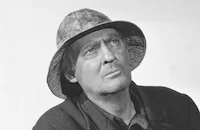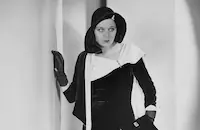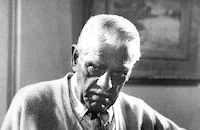The Yellow Ticket
Brief Synopsis
Cast & Crew
Raoul Walsh
Elissa Landi
Lionel Barrymore
Laurence Olivier
Walter Byron
Arnold Korff
Film Details
Technical Specs

Synopsis
In 1913, Marya Kalish, a twenty-two-year-old Jewish schoolteacher in Kiev, attempts to go to St. Petersburg to nurse her father in prison, but she cannot get a passport because of a Czarist decree forbidding travel by Jews. After she sees a Jewish prostitute traveling with a Russian wrestler, Marya pays a brothel madam to allow her to get a yellow ticket, which enables prostitutes to travel freely, but which, she learns later, stigmatizes them for the rest of their lives. Marya finds her father dead in the prison and vows revenge. In a St. Petersburg park, Baron Igor Andreeff, the womanizing chief of police, stops his nephew, Captain Nikolai, from attacking Marya after Nikolai prevented a drunken orderly from molesting her. When Andreeff sees Marya's yellow ticket, she runs away. Later, while traveling for a perfume company, Marya meets English journalist Julian Rolfe on a train, and he protects her from a lecherous man whom train officials put in her compartment because of her yellow ticket. Marya then provides information to help Julian write articles for British and American newspapers that expose the yellow ticket system, Russian corruption, tyranny, and the participation of the government in the massacres of the Jews. When Julian proposes marriage, Marya, ashamed of her status, refuses. On the night that Austria declares war on Serbia, Andreeff, who desires to muzzle Julian, but does not wish to jeopardize international good will, discovers that Marya is the source of his information. Marya relates her past to Julian, and they plan to marry, but when Andreeff sends a police agent to bother her, Marya goes to Andreeff's office to complain. She overhears Andreeff, on the telephone, issue an order for Julian to be sent to Siberia, and when Andreeff offers to rescind the order if she will have sex with him, she shoots him with a gun he has kept as a memento of another assassination attempt. Julian and Marya go to the English embassy and leave just as war breaks out. In the confusion, the police are unable to stop them.

Director

Raoul Walsh
Cast

Elissa Landi

Lionel Barrymore

Laurence Olivier
Walter Byron
Arnold Korff

Mischa Auer
Edwin Maxwell

Rita La Roy
Sarah Padden

Boris Karloff
Alex Melesh
Crew
R. H. Bassett
Guy Bolton
William Conselman
Rex Curtis
William Darling
O. O. Dull
Carli Elinor
Jack Epstein
Donald Flick
Jules Furthman
Don Gallagher
R. L. Hough
James Howe
Paul Lockwood
Jack Murray
David Ragin
Hayden Talbot

Film Details
Technical Specs

Quotes
Trivia
Notes
The title card reads "Raoul Walsh's The Yellow Ticket." According to information in the Twentieth Century-Fox Produced Scripts Collection at the UCLA Theater Arts Library, William Conselman wrote a "new finish," which was considerably different from the original ending. In the final shooting script dated July 24, 1931, the original ending is as follows: After Marya shoots Baron Andreeff, she encourages Julian, who is an American in this version, to go to the American Embassy and tell them that the baron has given orders for him to be sent to Siberia. Nikolai then finds his uncle dead, while Marya and Julian walk in the park where she first met Andreeff. After Julian leaves Marya to get money to allow them to leave the country, Marya is arrested, but she refuses to implicate Julian. During her interrogation, Nikolai brings in Julian, who has also been caught, and threatens to sentence him to the salt mines for life and to send Marya to a Siberian barracks town where she will be, to her disgust, a licensed yellow ticket holder. The American ambassador, whom Julian had contacted, then calls, and because Russia hopes to get a loan from America, Nikolai realizes that he has to let Julian go. Julian then reveals that he and Marya were married early that morning and threatens that the American press will publish Marya's story in three days unless he gives orders to the contrary. Nikolai then has them fill out forms for leaving, and he is surprised to learn that Julian is Jewish.
According to a Film Daily news item, Laurence Olivier replaced Edward Crandall in the role fo "Julian Rolfe." Some reviews list the last names of the character played by Elissa Landi, Arnold Korff and Sarah Padden as "Varenka" rather than "Kalish." John Barrymore starred in the play. The Spanish-dubbed version is entitled El carnet amarillo. According to modern sources, the British title of the film was The Yellow Passport. Modern sources also indicate that RKO loaned Olivier to Fox for this film. Astra Film Corp. produced a film in 1918 based on the same source, which starred Fannie Ward and was directed by William Parke (see AFI Catalog of Feature Films, 1911-20; F1.5160).

Miscellaneous Notes
Released in United States 1931
Released in United States 1978
Released in United States 1931
Released in United States 1978 (Shown at FILMEX: Los Angeles International Film Exposition (Special Programs - Treasures From the Museum of Modern Art Film Archives) April 13 - May 7, 1978.)











